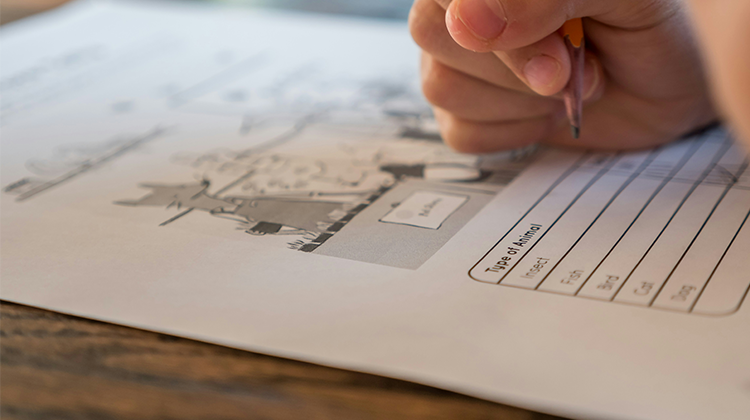Everyone enjoys doing quizzes and exercises when learning a second language.
When we learn a new language, we usually begin by learning vocabulary and quickly move on to learning the 7 or 8 million rules and exceptions…
But, if we do not have an opportunity to apply and use these rules, we can easily forget 25% of these rules.
This is where working with a good teacher can help.
A good teacher will correct written or spoken mistakes.
But that alone may not be enough to help the student get used to using the rules.
By adding quizzes and exercises to the mix, the student can test their knowledge and reinforce their language skills.
Here is a simple example of why quizzes and exercises may be quite helpful.
Let’s use an example from the Russian language.
If we directly translate a Russian sentence into English, word for word, the sentence would read as, “I am waiting David on the theatre”.
This sentence is correct in the Russian language, but the direct translation is not correct in English.
The correct English sentence would be, “I am waiting FOR David AT the theatre.”
The preposition “for” has at least 7 uses.
In the case above, the preposition for is being used to show a purpose.
The purpose of “for David” answers the question related to the verb “am waiting” and it answers the question “Why are you waiting?”
So, in English, “for” tells us the reason or purpose of:
- waiting for someone or something (usually followed by a noun or pronoun (David or him) or
- waiting for something to happen (e.g., waiting to receive the test results or waiting for summer).
Also, the preposition “on” often refers to something that is found on a surface (e.g., the book or food on the table).
The preposition “at” explains the location (where the person waiting is located (e.g., at the theatre)).
Memorizing information is not enough… we need to apply/use the information we have learned.
But by doing quizzes and exercises, we use our memory, but we also think and recall specific data we have learned.
Doing quizzes and exercises help us to improve:
RETRIEVAL
Quizzing is beneficial to a student’s learning because it involves retrieval practice (i.e., thinking back to information previously learned and bringing it to mind).
Cognitive psychology strongly suggests that the act of retrieving information directly helps students improve.
Cognitive psychology is the scientific study of mental processes such as attention, language use, memory, perception, problem-solving, creativity, and reasoning (in other words: how people think and process information).
There is clear evidence from psychological experiments that practicing retrieval of something after learning it, for instance by taking a quiz or test, makes you more likely to retain it for the long term.
DO QUIZZES ENHANCE INFORMATION RETENTION?
Retrieval aids retention, and quizzes excel in this aspect. While reading is useful, combining it with quizzes ensures more effective learning. Forcing the brain to retrieve/remember/recall information embeds it for future use. Indeed, quizzes contribute to better information retention.
FEEDBACK FOR TEACHERS
Providing frequent quizzes to students gives a teacher an idea of how well the student or class understands the topic.
Testing provides feedback to instructors and lets them know what has been learned or what has been forgotten or not been learned.
FEEDBACK FOR STUDENTS
Quizzes help students identify what they know and especially what they don’t know.
By identifying a learner’s mistakes, the student will then know what they need to work on and improve.
The feedback/results from quizzes can help students monitor their own progress
Furthermore, when a student does well on a quiz, it boosts the student’s confidence and motivates them to learn more.
EXPECTING A QUIZ
Studies have shown that students may pay closer attention to the lesson material when they are expecting to be quizzed.
Students who received the warning about the upcoming quiz did better than the students who were not given a warning.
This suggests that expecting a test can be beneficial to learning, and one way to set up test expectancy is to keep quizzing!
QUIZZES ARE LESS STRESSFUL THAN TESTS AND EXAMS
The power of quizzes lies in the low-stakes or no-stakes definition of the activity. Compared to tests, quizzes offer students the opportunity to practice their skills and knowledge without the fear of failure.
Also, according to a recent study, quizzing can help reduce test anxiety and stress for students, and this is another reason why teachers should use quizzes and exercises.
COLLABORATIVE QUIZZES
Quizzes can also be used creatively by having students work collaboratively to find and discuss the answers to the questions together.
Research has shown that when students worked in pairs to discuss the answers, they achieved a much higher score on their final exam.
SUMMARY ― THE BENEFITS OF DOING QUIZZES AND EXERCISES
Regularly doing quizzes has several benefits and include:
- practicing the information you are learning in a low-pressure activity
- allowing you to self-assess your knowledge of a subject
- showing you topics that need further revision
- doing quizzes will improve your concentration and information retention
- your confidence will increase
- your ability to concentrate will improve
- students who do quizzes and exercises do much (MUCH) better on final tests compared to non-quizzed students
- immediate feedback from instructors can positively impact a student’s performance, and
- best of all, quizzes are fun!
So, what do you think?
Are quizzes and exercises helpful?







